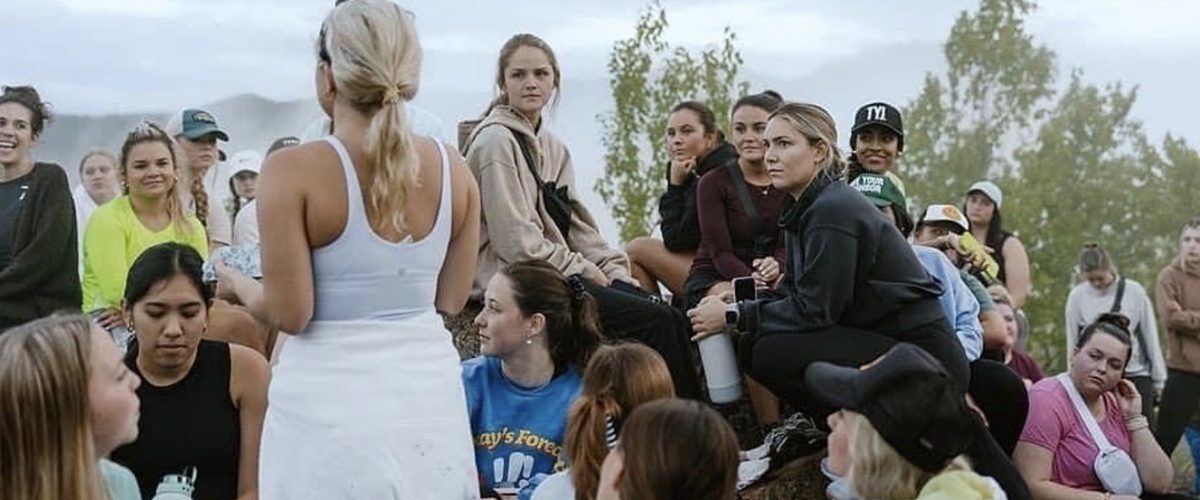After a Good Friday worship service, Anne-Tillery, a divinity school friend and I, were discussing gender roles in the church over ice cream at the local Kilwins.
The night before, we had found ourselves among a sizable group of sorority girls in an auditorium on Wake’s campus, curiously sitting in on a lecture advertised to Christian women in college. The lecturer was social media influencer and seminarian Grace Valentine.
Having gone to the lecture on a whim, I was Googling her bio as we walked in.
The author, speaker, retreat director, podcast host and “retired party girl” is most well-known for her ability to make Christianity accessible to college-aged women via social media (hence the large population of sorority girls in the audience). She was at Wake Forest to offer her advice on keeping faith and being yourself, from a former college girl to some current ones.

Mallory Challis
Although master of divinity students probably were not Valentine’s target audience that night, my friend and I shared some giggles while listening to her stories, considering her advice and admiring her freaky-good ability to quote Scripture without a Bible in sight.
During the Q&A section, I asked what her denominational affiliation was and how it impacted her work. Admitting she had bounced around a few different churches and was still exploring what denomination meant to her as a seminarian, she jokingly shared a hope to find a place where “women could at least talk.”
And in a room full of women, that comment got some chuckles. It seemed we all could relate to being asked to quiet down while the men are talking. But my divinity school friend and I felt the comment on a deeper level than the quick and witty moment seemed to allow.
In her successful and multifaceted career, it seems Valentine is not going to be silenced any time soon when it comes to spreading the gospel, which is a good thing. She’s meeting a spiritual need for a demographic of young believers often overlooked by the church. And she’s doing it in an accessible (and trendy) way.
But the next day at Kilwins, my friend and I were still hung up on our experience.
“Placed in a space without men and asked to lead, women’s spiritual gifts are suddenly exposed and empowered.”
We discussed how, in situations like lectures, Bible studies or retreats where only women are talking to other women, the complementarian hierarchy of leadership feels fuzzy. You have been taught all your life that women should not preach, proclaim or lead in church, or that women should not lead unless a man has a position of authority over her. But placed in a space without men and asked to lead, women’s spiritual gifts are suddenly exposed and empowered.
Yet, in these segregated situations, women’s leadership doesn’t feel as subversive as it might really be. Of course, there are no men in the room to out-rank the women, so who is our leadership threatening?
Admittedly, when led by women who are part of complementarian circles in their daily lives, these women-only experiences do tend to reinforce gender roles, such as the importance of maintaining sexual purity for your future husband. And when women are teaching other women how to submit, modeling this submission and even offering reasons why girls should accept these roles, it further perpetuates the complementarian worldview.
However, these situations are also often the only times when women in complementarian circles get to practice leadership or witness women in leadership. They are perhaps the safe spaces in which women and girls nurse a neglected calling into ministry.
Even if they are teaching a Bible study on “how to find the Boaz to your Ruth” for the umpteenth time, this image of female leadership is at least a little subversive of the patriarchy that holds women back.
I shared with Anne-Tillery memories of an annual girls retreat I attended all throughout my adolescence, which I had been reflecting on since listening to Valentine’s lecture. These are some of my fondest memories from my Wesleyan upbringing.
Although the retreat was stereotypically feminine and promoted classic gender roles, especially purity culture-style modesty, it was not as complementarian as some other situations I’ve found myself in.
In fact, I remember attending a breakout session in a tiny basement room of the retreat center led by a female pastor one year. She talked us through “those verses” often used to discourage women from leading in ministry and even left us with handouts guiding us through how to effectively defend ourselves against people who tried to negate our sense of calling.
At the time, I thought she was just very encouraging and kind of nerdy with her exegetical guides. Looking back, I can see she was taking advantage of an opportunity to affirm our sense of calling and self-worth, which she knew would take a few punches.
Still, I remember discussing with my friend how even though these women in leadership took the time to empower us directly in these spaces, for some of us girls, it was kind of a Catch-22.
“We could talk about our potentials for church leadership, but only during one specific weekend of the year which we spent secluded in a rural retreat center and only women around us.”
We could talk about our potentials for church leadership, but only during one specific weekend of the year which we spent secluded in a rural retreat center and only women around us. What about back home where the men were? Having witnessed and experienced the powerful leadership of women in ministry, how do you integrate that witness into your day-to-day complementarian spaces?
If I know one thing for sure, it’s that after attending a retreat year after year with only women preaching and ministering to us, only girls around me to fellowship with and only women and girls to exegete our Bible study texts, there was no doubt in my mind women are perfectly capable of leading in ministry.
I could see God’s call in action, even if the complementarians who controlled other spaces said differently.
Personally, I was lucky to attend a church with supportive pastors. I also had parents who supported my career goals because they not only believe in me, but (as my dad told a professor at my Wingate freshman orientation) they “aren’t going to question what the Big Guy wants” when it comes to calling.
While there certainly have been characters and spaces in my life that were not supportive of a woman seeking a ministry career, I got to leave these retreats and believe it was possible.
But not every woman is this lucky, especially those who grew up in Southern Baptist circles. And I sometimes wonder what it would’ve been like to go back home after feeling empowered by these women, after watching them so boldly proclaim the gospel and lead in ministry, then be asked to stay quiet about the work God was pressing me to do? Would I have been able to confidently defend my sense of calling in the face of peers, colleagues and others who have since begged me to sit back down and stop acting like women can preach?
Having experienced the joy, heartache, strength and liberation of saying “yes” to God’s calling on my life, I’d like to think nothing as arbitrary as gender roles would have been able to stifle it.
I am sad to report that Anne-Tillery and I did not solve the problem of complementarianism in the Christian church while sitting at Kilwins that night.
However, as we finished our waffle cones and pondered Grace Valentine’s lecture, we did agree that God is working through the bold (and often subversive) leadership of women in ministry. And right now, there are probably countless women and girls quietly nursing God’s call, whether they’re affirmed at home or not, because of women like Valentine who dare to use their voice to proclaim the gospel.
Mallory Challis is a master of divinity student at Wake Forest University School of Divinity. She is a former BNG Clemons Fellow.


